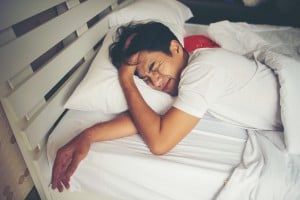By Theresa Woodard, internal medicine practitioner at Harbor of Health
Whether it’s socializing with friends, catching up on work or binge watching your favorite TV show, modern life has a way of cutting into our sleep.
But even the busiest people can make it a priority to get enough sleep. It pays off in terms of physical and emotional wellbeing, and can even make it easier to achieve those other components to good health – exercise and eating well.

Dr. Theresa Woodard at Harbor of Health can help patients improve their health by getting the sleep they need.
At Harbor of Health, we work with patients to address the specific issues that are keeping them from getting enough rest. To get you started, here are the basics that can help anyone:
How much sleep do I need?
Age is a big factor. Newborn babies can sleep up to 17 hours per day! Our sleep needs lessen as we age, and adults typically need seven to nine hours.
But sleep is a very individual thing. We’ve all heard of celebrities who get by on a few hours and we all have that friend who can’t get through the day without double digits.
Your doctor can help you assess how much sleep you need to function optimally. He or she will assess your overall health and ask you a few questions:
- How do you feel after specific amounts of sleep? Fitbits and similar devices make it easy to have a ballpark idea of how much sleep you’re getting.
- How long does it take you to fall asleep? Falling asleep before your head hits the pillow or struggling to doze off can both signal a problem.
- Do you need caffeine to get through the day?
- Do you have to keep hitting the snooze button in the morning?
- Are you tired when you’re driving or doing other normal activities?
Other signs you aren’t getting enough sleep include junk food cravings, skin breakouts, weight gain, irritability, memory lapses and simply not feeling well.
What happens if I don’t sleep enough?
Those signs of sleep-deprivation offer an idea of what happens to an over-tired person.

If you toss and turn at night, it can lead to sleep deprivation and impact everything from your metabolism to your ability to stay alert.
Your body releases more cortisol and ghrelin, which makes it hard to control your appetite and interferes with normal metabolism. Poor sleep can also impact your workouts thanks to decreased strength, compromised cardiovascular performance and slower recovery. All of that can make it harder to lose weight and get enough exercise.
Sleep deprivation can also simply make you feel lousy. You might wake up with a headache or body aches, even feeling nauseous. It may pass as you get more alert, but sleep deprivation can also genuinely make you sick – after a while, it weakens your immune system.
Being tired also messes with you emotionally. You can feel more irritable, moody and even depressed. Your memory, judgment, focus and other cognitive functions can suffer, and you can become clumsier and have a slower reaction time.
How can I get more sleep?

Relaxation techniques including yoga and meditation are good options to include in a pre-bedtime routine.
The good news is, there are easy ways to get better sleep. Your doctor can talk to you about additional options, but here’s what I suggest to my patients as a first step:
- Go to bed at the same time each night.
- Create a wind-down routine with decaf tea, a warm bath, meditation, yoga stretches, etc. to signal to your body it’s time to rest.
- Ban technology: Screens stimulate your senses, so turn off TVs, computers, tablets and phones before bed. Try reading a book or listening to soothing music.
- Avoid sugary foods, nicotine and alcohol before bedtime. Even if you fall asleep, they can disrupt your sleep cycle.
- Lights out: It’s best to sleep in a dark room, as exposure to light affects your natural circadian rhythm. If you need to, invest in light-blocking curtains or a good eye mask.
If you want to discuss more strategies for good sleep, come see me at Harbor of Health. I can help identify specific issues that are keeping you from getting the shuteye you need, and we can work together to get you more time in dreamland!